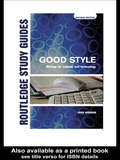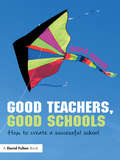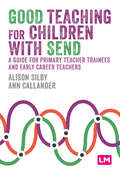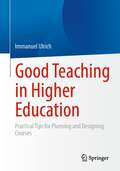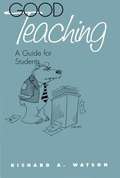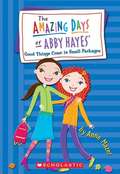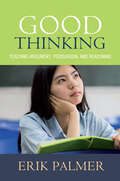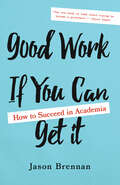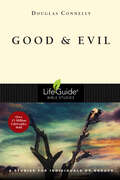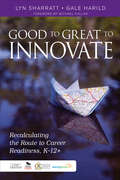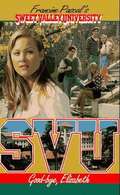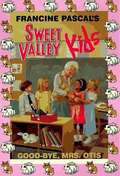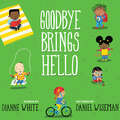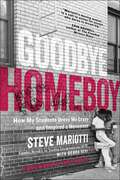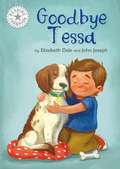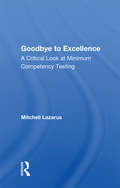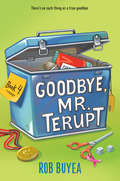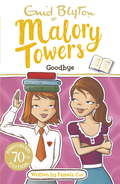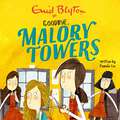- Table View
- List View
Good Style: Writing for Science and Technology
by John KirkmanGood Style explains the tactics that can be used to write technical material in a coherent, readable style. It discusses in detail the choices of vocabulary, phrasing and sentence structure and each piece of advice is based on evidence of the styles prefered by technical readers and supported by many examples of writing from a variety of technical contexts. John Kirkman draws from his many years of experience lecturing on communication studies in Europe, the USA, the Middle East and Hong Kong, both in academic programmes and in courses for large companies, research centres and government departments. Good Style has become a standard reference book on the shelf of students of science, technology and computing and is an essential aid to all professionals whose work involves writing of reports, papers, guides, manuals or on-screen texts. This new edition also includes information on writing for the web and additional examples of how to express medical and life-science information.
Good Teachers, Good Schools: How to Create a Successful School
by David Hudson'Good schools think with people and not to people' argues David Hudson in this thought-provoking practical guide for those wanting to bridge the gap between middle and senior management roles, and make a difference in their schools. Accessibly and engagingly written and packed with real-life examples, this book will prove essential reading for ambitious teachers and deputy heads everywhere. Whilst many management books tend to overcomplicate David writes with refreshing clarity and simplicity of thought. He sets out to inspire his readers to improve their practice and offers tried and tested strategies and solutions. Good teachers, good schools is a must have read for anyone interested in a senior school leadership role and for those leaders keen to improve their leadership style. The book covers every aspect of school leadership, from the decisions senior school leaders need to make such as running meetings, staffing and communication with staff and pupils to the difference between management and leadership and curriculum involvement including monitoring evaluation and self-evaluation. David Hudson encapsulates many principles that have made him a successful school leader. David Hudson has been teaching in secondary schools since 1973 and he has had a wide range of leadership and management roles including that of Head Teacher in two 11 – 18 schools.
Good Teaching for Children with SEND: A guide for primary teacher trainees and early career teachers
by Ann Callander Alison SilbyTrainee and beginning primary school teachers must learn how to support children to overcome or reduce barriers to learning. They need to build confidence in their use of teaching approaches that support Good Teaching for SEND, Good Teaching for All. This practical textbook presents evidenced-based Adaptive Teaching strategies, foundation knowledge and classroom approaches to support the learning of all children. Each chapter links to a Teachers′ Standard and includes adaptable exemplar teaching activities, based on what we know works in classrooms. This is a core text for primary teacher training, supporting new teachers to ensure their classrooms are truly inclusive for all children, including those with SEND.
Good Teaching for Children with SEND: A guide for primary teacher trainees and early career teachers
by Ann Callander Alison SilbyTrainee and beginning primary school teachers must learn how to support children to overcome or reduce barriers to learning. They need to build confidence in their use of teaching approaches that support Good Teaching for SEND, Good Teaching for All. This practical textbook presents evidenced-based Adaptive Teaching strategies, foundation knowledge and classroom approaches to support the learning of all children. Each chapter links to a Teachers′ Standard and includes adaptable exemplar teaching activities, based on what we know works in classrooms. This is a core text for primary teacher training, supporting new teachers to ensure their classrooms are truly inclusive for all children, including those with SEND.
Good Teaching in Higher Education: Practical Tips for Planning and Designing Courses
by Immanuel UlrichHow do I plan my course? How can I inspire students? How do I present myself? How do I want to teach? How do I test correctly? What teaching methods are there?Due to the lack of comprehensive (university) didactic training, teachers too often have to answer these and many other questions for themselves. This book is intended to counteract this and presents practical tips on good university teaching for all disciplines based on the current state of research.
Good Teaching: A Guide for Students
by Richard A. WatsonFrom the back cover: EDUCATION From junior college to Ivy League university, the level of teaching ranges from "great to awful," according to Richard A. Watson, who explains not only how to survive but how to profit from and enjoy your college experience. To help students make important personal choices- What school? What major? What classes?-Watson discusses such broad areas as administrative structure, institutional goals, and faculty aspirations. Charging the student with the ultimate responsibility for learning, Watson presents certain academic facts of life: teaching is not the primary concern of either faculty or administration in most institutions; few professors on the university level have had any training in teaching, and even fewer started out with teaching as their goal; senior professors do not teach much-the higher the rank and salary, the less time in the classroom-and those seeking tenure must emphasize research to survive; and almost certainly, the bad teacher who is a good researcher will get paid more than the good teacher who does not publish. This is a book about good teaching and how to find it. Rejecting the conventional wisdom that a professor devoted to research will not be good in the classroom, Watson advises that you take classes from that "old bear" you are afraid of, from the professor you may have been cautioned to avoid. "Professors who are really devoted to research in their fields are the best teachers," Watson counsels, "at least for students who know what they want and are willing to give their all for it." The reason: "Most college professors are where they are because they fell in love with a subject matter. They think nothing else in the world is more important than learning it."
Good Things Come in Small Packages (Amazing Days of Abby Hayes #12)
by Anne MazerWhen Abby and her new friend, Hannah, take charge of a class project to assemble gift packages for underprivileged children, one thing after the next goes wrong. First their teacher, Mrs. Kantor, must leave school for a few weeks. The class is stuck with a mean substitute who won't let them work on their gift boxes. Then, after their kind principal intervenes and work on the class project resumes, Hannah's baby sister unintentionally destroys many of the gift boxes. Working as a team, Abby and Hannah think of a clever way to save the day, their budding friendship, and the class project.
Good Thinking: Teaching Argument, Persuasion, and Reasoning
by Erik PalmerOur daily communication involves argumentation and reasoning, but how well do we prepare students for these tasks? Are they able to persuade others, make solid purchasing decisions, or analyze the messages in the media? In his new book, Good Thinking: Teaching Argument, Persuasion, and Reasoning, Erik Palmer shows teachers of all subject matters how to transform the activities they already use into openings for improving student thinking. He demonstrates how to critically evaluate a point of view, understand rhetorical devises, apply logic, and build an effective argument, written or oral. Blending theory with practice, Palmer shares a wide range of classroom-tested lessons, including:How to understand argument in paintings and images Addressing ad hominem attacks using a traveling debate Creating a class comedy club, where students write syllogisms and analyze character and plot development Teaching logic through a class 'Booger Patrol' Palmer explains complex concepts in simple, practical language that gives teachers a deft understanding of the principles of good arguments, proper use of evidence, persuasive techniques, and rhetorical tricks. He reveals how all students, not just those in advanced classes, can begin developing sophisticated reasoning skills that will improve their oral and written communications, both in and outside of the classroom. '
Good Work If You Can Get It: How to Succeed in Academia
by Jason BrennanWhat does it really take to get a job in academia?Do you want to go to graduate school? Then you're in good company: nearly 80,000 students will begin pursuing a PhD this year alone. But while almost all new PhD students say they want to work in academia, most are destined for something else. The hard truth is that half will quit or fail to get their degree, and most graduates will never find a full-time academic job. In Good Work If You Can Get It, Jason Brennan combines personal experience with the latest higher education research to help you understand what graduate school and the academy are really like. This candid, pull-no-punches book answers questions big and small, including• Should I go to graduate school—and what will I do once I get there?• How much does a PhD cost—and should I pay for one?• What does it take to succeed in graduate school? • What kinds of jobs are there after grad school—and who gets them? • What happens to the people who never get full-time professorships? • What does it take to be productive, to publish continually at a high level? • What does it take to teach many classes at once? • How does "publish or perish" work? • How much do professors get paid?• What do search committees look for, and what turns them off? • How do I know which journals and book publishers matter? • How do I balance work and life?This realistic, data-driven look at university teaching and research will help make your graduate and postgraduate experience a success. Good Work If You Can Get It is the guidebook that anyone considering graduate school, already in grad school, starting as a new professor, or advising graduate students needs. Read it, and you will come away ready to hit the ground running.
Good and Evil (LifeGuide Bible Studies)
by Douglas Connelly®PDF download with a single-user license; available from InterVarsity Press and other resellers.
Good to Great to Innovate: Recalculating the Route to Career Readiness, K-12+
by Lyn D. Sharratt Dr Gale HarildGuide your students to a successful future in the new economy Learn how outstanding schools on five continents address career readiness, and how your program can best prepare students for a successful future. Written for education leaders at all levels, this resource shows how to: Design a continuum of learning that empowers your students to become independent decision-makers Consistently support student voice and choice through all grade levels Integrate multiple Pathways to opportunity in your curriculum by developing local community partnerships Develop an approach to career readiness that recognizes the value of college, the workplace, university and the new “gold collar” jobs, including technology and the skilled trades
Good to Great to Innovate: Recalculating the Route to Career Readiness, K-12+
by Lyn D. Sharratt Dr Gale HarildGuide your students to a successful future in the new economy Learn how outstanding schools on five continents address career readiness, and how your program can best prepare students for a successful future. Written for education leaders at all levels, this resource shows how to: Design a continuum of learning that empowers your students to become independent decision-makers Consistently support student voice and choice through all grade levels Integrate multiple Pathways to opportunity in your curriculum by developing local community partnerships Develop an approach to career readiness that recognizes the value of college, the workplace, university and the new “gold collar” jobs, including technology and the skilled trades
Good-bye, Elizabeth (Sweet Valley University #38)
by Francine Pascal Laurie JohnElizabeth Wakefield is about to say hello to an exciting new school. But first she has to say good-bye to everything -- and everyone -- she loves. Good-bye to Nina Harper, her best friend. Good-bye to Todd Wilkins, the ex-boyfriend who's stood by her through thick and thin. Good-bye to Tom Watts, the guy who broke her heart into a million pieces. But how can she say good-bye to her twin sister, Jessica?
Good-bye, Mrs. Otis (Sweet Valley Kids #70)
by Francine PascalIn the words of 7-year-old Elizabeth Wakefield. Mrs. Otis is leaving our school. Forever. We're having a party to say good-bye. But Mr. Bunny (our class pet) is lost! Mrs. Otis gave him to us. So how can we have a party without Mr. Bunny? My friend Winston has a great idea. He's going to put rabbit ears on his cat Friskie and bring him to our room in disguise! I hope no bunny gets in trouble. And I hope we find the real Mr. Bunny fast.
Good-natured Man With Introduction And Notes
by Goldsmith Edited By K. Deighton.SHORTLY after the publication of The Vicar of Wakefield, in 1766, Goldsmith began to think of writing a comedy, and in 1767 The Good-Natured Man was submitted for Garrick’s approval. Garrick, however, insisted upon great alterations being made, and Goldsmith declining to comply, the comedy was declined. It was, however, accepted by George Colman, the elder, then manager of Covent Garden Theatre, and there produced in January 1768, the Prologue being written by Dr Johnson. The result was fairly suc-cessful, though the scene of the bailiffs was objected to as being “ low,” and was afterwards cut out on the stage, to be restored, however, shortly afterwards, when the play was published. The Good-Natured Man ran for ten nights, and Goldsmith’s share of the profits was £400. A further sum of £100 was received by him from the publication of the pla
Goodbye Brings Hello: A Book of Firsts
by Daniel Wiseman Dianne WhiteLike Bernie Waber's COURAGE and Davis' KINDERGARTEN ROCKS!, this inspiring, vibrantly illustrated gift book is perfect for celebrating life's milestones, both great and small—especially that first day of kindergarten.There are many ways of letting go. With each goodbye, a new hello. From being pushed on a swing to learning how to pump your legs yourself, from riding a beloved trike to mastering your first bike ride, from leaving the comforts of home behind to venturing forth on that first day of school, milestones are exciting but hard. They mean having to say goodbye to one moment in order to welcome the next. Honest and uplifting, this cheerfully illustrated ode to change gently empowers readers to brave life's milestones, both large and small.
Goodbye Homeboy: How My Students Drove Me Crazy and Inspired a Movement
by Steve Mariotti Debra DeviOne sunny afternoon in 1982, a young businessman experienced a terrifying mugging in New York City that shook him to his core. Tortured by nightmares about the teens who roughed him up, Steve Mariotti sought counseling. When his therapist suggested that he face his fears, Mariotti closed his small import-export business and became a teacher at the city's most notorious public school--Boys and Girls High in Bed-Stuy. Although his nightmares promptly ceased, Mariotti's out-of-control students rapidly drove him to despair. One day, Mariotti stepped out of the classroom so his students wouldn't see him cry. In a desperate move to save his job, he took off his watch and marched back in with an impromptu sales pitch for it. To his astonishment, his students were riveted. He was able to successfully lead a math lesson for the first time. Mariotti realized his students felt trapped in soul-crushing poverty. They saw zero connection between school and improving their lives. Whenever Mariotti connected their lessons to entrepreneurship, though, even his most disruptive students got excited about learning. School administrators disapproved of Mariotti discussing money in the classroom, however. He was repeatedly fired before receiving one last-ditch assignment: an offsite program for special-ed students expelled from the public schools for violent crimes. The success Mariotti had with these forgotten children—including coverage in the Daily News, The New York Times, and World News Tonight—inspired him to found the nonprofit Network for Teaching Entrepreneurship to bring entrepreneurship education to low-income youth. By turns tragic and hilarious, Goodbye Homeboy shares Mariotti's flaws and missteps as he connects deeply with his troubled students, and woos the most influential people in the world into helping them—saving himself in the process. Today, Mariotti is widely recognized as the world's leading advocate for entrepreneurship education. More than one million young people from Chicago to China have graduated from NFTE programs, and NFTE counts Sean Combs, Chelsea Clinton, Diana Davis Spencer, and many more business, entertainment, and community leaders among its staunchest supporters. As Goodbye Homeboy powerfully illustrates, a spark of hope really can empower us to overcome life's greatest hardships.
Goodbye Mr Chips
by James HiltonGoodbye, Mr. Chips is a novella about the life of a schoolteacher, Mr. Chipping. Stories in Easy English by Madhubun Reading Club.
Goodbye Tessa: Independent Reading White 10 (Reading Champion #249)
by Elizabeth DaleReading Champion offers independent reading books for children to practise and reinforce their developing reading skills.Fantastic, original stories are accompanied by engaging artwork and a reading activity. Each book has been carefully graded so that it can be matched to a child's reading ability, encouraging reading for pleasure.
Goodbye To Excellence: A Critical Look At Minimum Competency Testing
by Mitchell LazarusIn recent years, concern over high school graduates who could not balance checkbooks or read directions has led many states to require students to pass minimum competency tests before receiving their diplomas. This, legislators believe, will again make diplomas meaningful, as well as promote better education. Dr. Lazarus points out that any testing scheme creates inequities and that these tests are of special concern due to the emphasis society places on high school graduation; a just society cannot accept their potential to mark a student for life. The problem, he believes, is that society cannot agree on the goals of education, making relevant testing difficult. He also questions whether such testing will produce better curricula and notes that, while more emphasis on the basics may be needed, undue stress on them may weaken other parts of the curricula. He concludes that the goals of minimum competency testing are laudable, but that implementation may do long-term damage to education.
Goodbye, Mr. Chips
by James HiltonGOODBYE, MR. CHIPS is the story of the wonderful, gentle English schoolmaster whose name has become beloved throughout the world. There is not another book, with the possible exception of Dickens' A CHRISTMAS CAROL, which has quite the same hold on readers' affections, James Hilton wrote MR. CHIPS in loving memory of his schoolmaster father, and in tribute to his profession. Over the years it has won an enduring place in world literature, and made untold millions of people smile, with a catch in the throat.
Goodbye, Mr. Terupt (Mr. Terupt)
by Rob BuyeaThe seven kids who bonded in Mr. Terupt's fifth-grade class are in eighth grade now and reunited with their beloved teacher. Readers will once again be inspired by how the kids face their challenges and by the adults who help them along the way.Jeffrey, Alexia, Anna, Danielle, Luke, Peter, and Jessica are thrilled to have their beloved teacher, Mr. Terupt, back for the school year as their biweekly adviser. They still rely on him for guidance on so many things, including these dilemmas:JEFFREY wants to make varsity wrestling, but at what cost? Worried that she may have the same cancer gene as her mom, ALEXIA takes a DNA test--only she's scared to open the results. Neglected by her soon-to-be-married mom, and wounded by Jeffrey's callous brush-off, ANNA keeps her hurt feelings bottled up--until she can't. DANIELLE has ups and downs with her diabetes, but her budding romance with Luke proves to be the real challenge. LUKE's tackling lots of difficult schoolwork, none of it harder than letting Danielle know he likes her. Anxious about her dad's return, JESSICA pours her heart into writing poetry. Angry at what he thinks is a betrayal, PETER gives Mr. Terupt the silent treatment.To celebrate their remaining time with Mr. Terupt, the students hatch bucket-list type projects to make the school year important, memorable, and way bigger than just the group. Will the gang stick together down to the final project? Will their friendships endure after the difficult goodbye?
Goodbye: Book 12
by Enid BlytonWelcome to Malory Towers, where there's more to life than lessons!Head Girl Felicity Rivers can hardly believe it's nearly time to leave her beloved school. The sixth-formers are hoping for a restful final term but headmistress Miss Grayling has other ideas - and so does an old pupil who makes a surprising return. Not everyone is happy to see her, and soon she is having a difficult time. Can Felicity solve the problems, with some help from a few other familiar faces?Malory Towers is now a fantastic television drama, available on BBC iPlayer and on CBBC.Between 1946 and 1951, Enid Blyton wrote six novels set at Malory Towers. Books 7-12 are authorised sequels of the series written by Pamela Cox in 2009 and focus on the adventures of Felicity Rivers, Susan Blake, and June Johns. This edition is unillustrated.*Malory Towers ®, Enid Blyton ® and Enid Blyton's signature are registered trade marks of Hodder & Stoughton Limited. No trade mark or copyrighted material may be reproduced without the express written permission of the trade mark and copyright owner.
Goodbye: Book 12 (Malory Towers #12)
by Enid BlytonWelcome to Malory Towers, where there's more to life than lessons!Head Girl Felicity Rivers can hardly believe it's nearly time to leave her beloved school. The sixth-formers are hoping for a restful final term but headmistress Miss Grayling has other ideas - and so does an old pupil who makes a surprising return. It is not a great success. Can Felicity solve the problem, with some help from a few other familiar faces? Between 1946 and 1951, Enid Blyton wrote six novels set at Malory Towers. Books 7-12 are authorised sequels of the series written by Pamela Cox in 2009 and focus on the adventures of Felicity Rivers, Susan Blake, and June Johns. This edition is unillustrated.(P) 2019 Hodder & Stoughton Limited Malory Towers ®, Enid Blyton ® and Enid Blyton's signature are registered trade marks of Hodder & Stoughton Limited. No trade mark or copyrighted material may be reproduced without the express written permission of the trade mark and copyright owner.
Goodbye: Book 12 (Malory Towers #42)
by Enid BlytonWelcome to Malory Towers, where there's more to life than lessons!Head Girl Felicity Rivers can hardly believe it's nearly time to leave her beloved school. The sixth-formers are hoping for a restful final term but headmistress Miss Grayling has other ideas - and so does an old pupil who makes a surprising return. Not everyone is happy to see her, and soon she is having a difficult time. Can Felicity solve the problems, with some help from a few other familiar faces?Malory Towers is now a fantastic television drama, available on BBC iPlayer and on CBBC.Between 1946 and 1951, Enid Blyton wrote six novels set at Malory Towers. Books 7-12 are authorised sequels of the series written by Pamela Cox in 2009 and focus on the adventures of Felicity Rivers, Susan Blake, and June Johns. This edition is unillustrated.*Malory Towers ®, Enid Blyton ® and Enid Blyton's signature are registered trade marks of Hodder & Stoughton Limited. No trade mark or copyrighted material may be reproduced without the express written permission of the trade mark and copyright owner.
